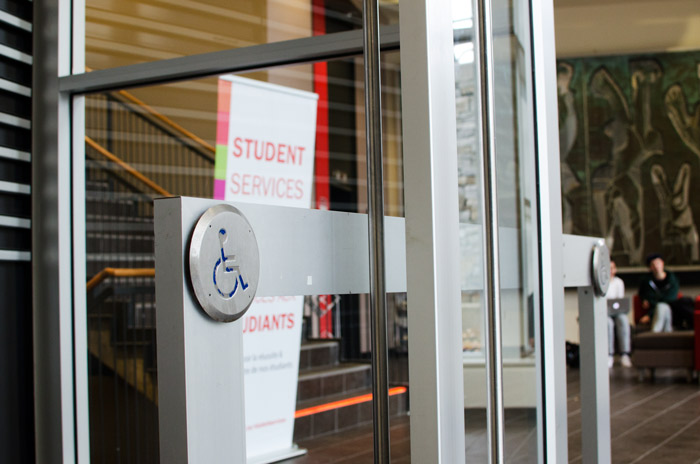McGill is seeking to incorporate universal design—an approach towards the establishment of an environment that adapts to everyone’s needs—to the physical layout of its buildings and accessibility of the university as a whole. The thinking behind universal design is that disabling situations within people’s environments are what affect individuals with impairments; disability stems thus from the environment, attitudes, and systems, instead of from the individual. It is this approach that is guiding the administration in adapting the design of McGill’s Downtown and Macdonald Campuses to create an accessible environment for all students.
Due to the age and layout of many McGill buildings, the promotion of physical accessibility is challenging; however, under Article 15 of McGill’s University Policy Concerning the Rights of Students with Disabilities, there is an ongoing effort to remove all architectural barriers that limit students with disabilities from full participation in university life.
The Office for Students with Disabilities (OSD) provides a collection of campus access guides, which are downloadable as PDFs, and detail the accessibility of all buildings through maps that highlight wheelchair accessible entrances, elevators, wheelchair accessible washrooms, and accessible parking.
The campus access guides also list drop-off locations for Paratransit, Montreal’s adapted public transport system. In addition, McGill campus has its own adapted mobility bus, which is a free service available to all individuals with impairments and injuries that compromise mobility.
The adoption of universal design at McGill applies to more than physical barriers, and includes the modification services such as OSD’s note-taking service to make it more accessible to all McGill students.
“We have dozens and dozens of diagnoses, whether they be physical or related to mental health—so it becomes literally impossible for disabilities service providers to be targeting specific knowledge to specific situations,” said Frederic Fovet, the former director of the OSD, in a video interview about universal design.
It is therefore far more sustainable to provide these services to all McGill students who request them. The universalization of services and buildings on campus stands to benefit all students and move McGill towards a more sustainable system of promoting accessibility.
There is still much work to be done, however, in making the campus accessible to all students. Specifically, there is room for improvement with regards to student housing at McGill and the creation of more wheelchair-accessible dorms. Student Housing and Hospitality Services (SHHS) and OSD have collaborated to make more equitable and accessible spaces in residence. They have created the Accessibility Hub, a centralized resource on accessibility and housing at McGill, for this purpose. SSHS and OSD have also compiled a residence comparison chart, which allows students to view which residences include universally accessible rooms.
While there is still much work to be done, McGill’s adoption of the Standards for Barrier-Free Campus, a list of goals to remove access barriers, means that the university is working towards eliminating disabling situations on campus. The standards include efforts such as adopting universal design for all building entrances so that people with disabilities may enter and exit through the same places as the general university population. Other initiatives include: Providing barrier-free washrooms at the main entrance level of every McGill building when feasible, creating spaces for wheelchairs in auditoriums, theatres, lecture halls, and classrooms, and providing at least one exterior accessible parking space outside of every major building complex.
The promotion of equity and the removal of access barriers on campus, in terms of architecture, availability, and visibility, will gradually allow for more people to have access to a McGill education and reap all of its benefits
This article was corrected on Nov. 4, 2015. The Tribune regrets these errors.








